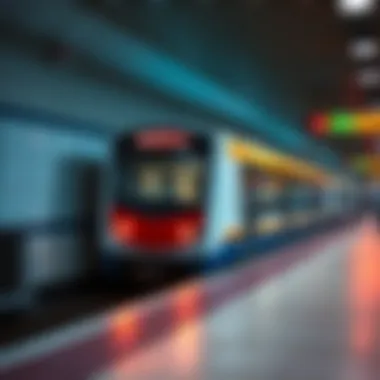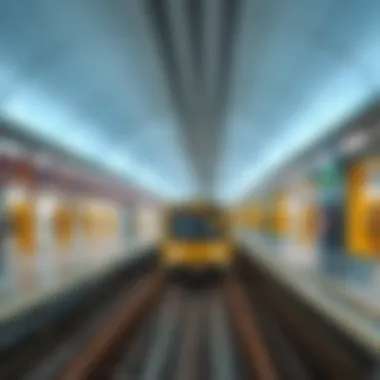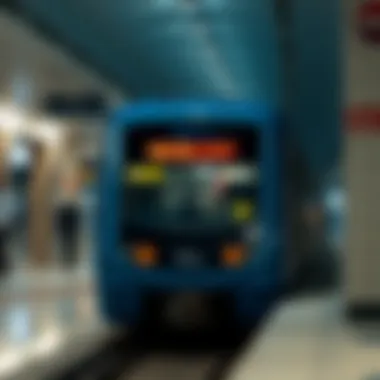Comprehensive Guide to Dubai Metro Saturday Timings


Intro
Navigating the Dubai Metro on Saturdays can be quite the experience. As a cornerstone of urban transit in this bustling city, understanding its operational hours is essential for both residents and visitors alike. Unlike its counterparts in other metropolises, the Dubai Metro exhibits a unique rhythm on weekends, which can greatly influence commuter patterns and the overall travel experience.
Saturdays often draw a varied crowd ranging from tourists exploring the city to locals going about their weekend errands. Knowing when the train runs and how often it arrives can save time and enhance efficiency on what is usually a busy day. Through this article, we will delve into the specifics of Dubai Metro timings on Saturdays, highlight factors that shape its schedule, and offer insights that empower riders to make informed travel decisions.
In dissecting these elements, we aim to portray how the metro system not only facilitates transportation but also integrates itself into the urban landscape of Dubai—a city that never seems to slow down.
Overview of Dubai Metro
Dubai's rapid transit system stands as a major pillar in the city’s ambitious urban landscaping, connecting districts and residences with ease. The Dubai Metro not only alleviates the congestion that can sometimes feel like a heavy cloud over the roads but also introduces a level of modernity all its own.
Metro System Infrastructure
The infrastructure surrounding the Dubai Metro is quite impressive. Comprising two main lines, the Red Line and the Green Line, it's designed to serve a vast range of commuters from the bustling areas of Deira to the more lively Dubai Marina. Built with a mix of elevated and underground tracks, it's akin to a silver vein running through the heart of this vibrant city. The stations are not just transport hubs; they are sleek and spacious, featuring amenities that cater to a wide audience, including engravings that showcase local art and culture.
Moreover, the entry and exit points are strategically placed to cater to potential foot traffic, making access to and from the metro seamless. For the tech enthusiast, the installation of various digital displays aids in communication, informing passengers of waiting times and schedule updates. This infrastructure emphasizes the metro’s role as both a transport solution and a community space.
Importance in Urban Transport
The significance of the Dubai Metro extends beyond mere transit. It's a lifeline for commuters, students, and tourists alike. In a city known for its rapid growth and heavy reliance on vehicles, the Dubai Metro offers a breath of fresh air, reducing reliance on personal transport while promoting a more sustainable way of commuting.
Consider the reduction in carbon footprint as one positive hand in this balancing act of urban lifestyle and environmental responsibility. The convenience of the metro can also increase the value of properties nearby, transforming once-sleepy neighborhoods into bustling hotspots, attracting both homebuyers and investors. The effect is a ripple across the urban landscape, as areas surrounding metro stations see increased interest and subsequent development.
Quote:
Dubai Metro Operational Hours
Understanding the operational hours of the Dubai Metro is essential for navigating the city efficiently. This section will delve into the daily functioning of the metro system, emphasizing its significance in urban life. The focus on Saturdays, in particular, reflects the unique travel patterns and operational considerations that differ from weekdays.
General Weekday Operations
During weekdays, the Dubai Metro operates with a consistent schedule, generally opening around 5 AM and closing at midnight. This allows commuters ample time to get to their jobs or other engagements. The service operates more frequently during peak hours, which typically show a marked increase in ridership as citizens head to work or school.
- Peak Frequency: Trains run every 2-4 minutes during morning and evening rush hours, catering to high commuter traffic.
- Off-Peak Hours: In less busy periods, the interval can extend to 7-10 minutes.
This flexibility ensures the metro serves as a vital commute tool, keeping the flow of traffic manageable while reducing the carbon footprint compared to private vehicle use.
Saturday-Specific Timing
Saturdays introduce a different rhythm to the Dubai Metro schedule. Unlike weekdays, the Saturday operations reflect a blend of commuting patterns influenced by leisure travel and rest days.
- Start Time: The metro on Saturdays typically starts running at 10 AM, a significant shift from the earlier weekday start time.
- End Time: The last train departs closer to 1 AM, providing late-night options for those enjoying weekend activities.
**Key Considerations:
- Frequency:** The intervals vary throughout the day.
- In the morning, there are fewer trains to accommodate shoppers and tourists.
- In the late afternoon and evening, the service ramps up to better serve those returning from outings.


"Understanding the Saturday schedule not only aids in planning timely commutes but also allows for maximizing leisure time across the vibrant city."
Adjustments made to operational hours on Saturdays highlight the flexibility of the metro system to cater to the changing needs of passengers. For homebuyers, investors, expatriates, and property managers, these details are crucial in assessing property value, accessibility, and lifestyle in proximity to metro lines.
In summary, familiarity with the Dubai Metro's operational hours, particularly on Saturdays, enhances the experience for all riders, fostering an efficient, effective transportation network essential in such a bustling urban landscape.
Saturday Schedule Details
Importance of Saturday Schedule Details
To truly grasp the operational dynamics of the Dubai Metro, it's vital to delve into the Saturday schedule. Saturdays serve as a bridge between the bustling weekdays and the more laid-back Sunday. Understanding how these timings work is not just useful; it’s essential for commuters who plan their weekends around the Metro's schedule. With many businesses opening later on this day, the associated benefits can often be overlooked. Being aware of the Saturday schedule helps passengers avoid the unnecessary stress of long waits or crowded trains when they venture out.
Morning Operations
Start Time
On Saturdays, the Dubai Metro kicks off its morning operations typically at 6:00 AM. This timing caters exceptionally well to early risers and commuters heading to various weekend engagements. The key characteristic of the 6:00 AM start is its alignment with both business and leisure needs, setting a solid foundation for the day ahead. The choice of this early hour often attracts those eager to maximize their weekend productivity or leisure. However, it's worth noting that while it may be convenient for some, the early start might not suit everyone, particularly tourists wanting a leisurely start to their Saturday.
Frequency of Services
On Saturdays, the frequency of Metro services is set to every 10–15 minutes during the morning rush, marking a crucial element of the experience. This relatively short waiting period encourages both commuters and visitors to utilize the Metro rather than other forms of transport. Its frequency underscores an important point: the Metro is user-friendly and time-efficient, particularly significant for those needing to attend events or meet friends promptly. However, during peak hours, one may still experience crowded trains, so it helps to be prepared for that possibility.
Afternoon and Evening Operations
Peak Hours
As the day transitions into afternoon, typically around 1:00 PM until about 4:00 PM, peak hours shift slightly compared to weekdays. Many families and groups take advantage of their free Saturdays, which boost traffic significantly. This uptick in passenger numbers accentuates the Metro's role in urban mobility. The essence of peak hours on Saturday is a mix of leisurely trips to shopping malls or recreational zones across the city. Understanding the ebb and flow during this time is vital for commuters wanting to avoid the most packed trains.
Adjustments to Frequency
In response to the surging demand during Saturday afternoons, the Dubai Metro adjusts its services with heightened frequency. Typically, intervals might shorten to every 7–10 minutes, accommodating the influx of travelers better. This adjustment is particularly beneficial for those intending to explore major attractions or catch a late lunch with friends. However, while this change aims to alleviate congestion, it’s crucial for riders to factor in potential delays during especially busy times, like around holiday periods.
Overall, the Saturday schedule of the Dubai Metro is designed to enhance accessibility while meeting diverse commuter needs seamlessly.
By being cognizant of the Saturday-specific timing and operational characteristics, passengers can navigate their journeys effectively and enjoy the rich offerings of Dubai’s vibrant urban landscape.
Passenger Considerations
Passenger considerations play a pivotal role in understanding how the Dubai Metro aligns with the needs and behaviors of its users, particularly on Saturdays. Commuters must recognize various factors that can shape their experience, from traffic patterns to seasonal influences. By grasping passenger behavior, travelers can plan their journeys more effectively, ensuring they make the most coherent choices while navigating the vast cityscape.
Commuter Traffic Patterns
Morning Rush
The morning rush on Saturdays presents a distinctive phenomenon. It’s a time when the city starts to awaken and individuals are gearing up for a range of activities. Many residents take advantage of the metro to go for errands, shopping, or even a leisure outing.
One key characteristic of the Saturday morning rush is its rhythm, which is far less frenetic than on weekdays. While you won't see the masses typically associated with Monday through Friday, you will encounter families and individuals who prefer to embark on their adventures early. This choice is particularly beneficial for passengers because it allows them to avoid crowds that typically build up as the day progresses.
A unique feature of this time is the metro's frequency, as services run more regularly to accommodate those eager to start their Saturdays. However, while the smooth journey is an advantage, one must consider potential delays. Maintenance works or service changes can result in unexpected wait times, which could affect early plans.
Leisure Travel in the Afternoon


As the day transitions into the afternoon, the metro experiences a shift in passenger demographics. This is a period when leisurely travelers take center stage. Tourists and locals alike utilize the metro to reach various attractions, adding a layer of vibrancy to the travel experience.
The enthusiasm during this time is palpable, with many taking the opportunity to visit malls, parks, and cultural spots. The characteristic of afternoon leisure travel is its leisurely pace; passengers generally have fewer time constraints compared to the urgency of the morning rush. This makes the afternoon a popular choice for relaxed outings.
A unique feature to note is how certain stops tend to become hubs of activity, particularly when it comes to event scheduling. However, visitors might find crowds growing at popular stops, which can sometimes present a disadvantage. It’s beneficial to always check the metro timings and potential event schedules to better plan your journey.
Seasonal Variations
Understanding seasonal variations can greatly enhance the commuting experience on Saturdays, influencing everything from passenger volumes to operational timing.
Tourist Influence
Tourist influence is often magnified on Saturdays, with many visitors drawn to Dubai’s vibrant lifestyle. This influx contributes significantly to the dynamic atmosphere of the metro on this day. The uniqueness of this influence lies in how tourist patterns can dramatically swell ridership during peak seasons.
The key characteristic of this surge is its unpredictability; specific seasons, such as festivals or holidays, bring a notable increase in tourist numbers. This fact enables our article to emphasize how important it is for regular commuters to adjust their expectations and travel times accordingly. Although this influx can be seen as a disadvantage due to potential overcrowding, it also fosters a sense of community and engagement within the metropolitan experience.
Local Events Impact
Local events hold considerable sway over metro usage on Saturdays, shaping the travel landscape in various ways. It’s no secret that Dubai is a city brimming with activities, from concerts to sporting events that often coincide with the weekend. The characteristic of such local events is their tendency to draw significant crowds, which can lead to heightened demand for metro services.
The impact of these events extends beyond monetary considerations; they create enthusiasm within the community, offering a shared experience for both residents and visitors. However, this vibrant atmosphere can also present challenges. Passengers may find it challenging to navigate crowded stations or face delayed services. Therefore, understanding event schedules and their effects on transportation can provide an edge when planning travel.
"Knowledge of the environment leads to better choices; knowing when to travel can save time and enhance the experience."
For more insight into the operational trends, one can refer to sources like Dubai Metro's official site or explore knowledge on urban transportation trends at Wikipedia.
Impacts of Timing on Accessibility
Understanding timing as it relates to accessibility is crucial, especially when discussing a public transport system like the Dubai Metro. Timing influences not only the ease of getting from point A to point B but also the overall experience of commuting. For residents and travelers alike, knowing the operational hours and schedules of the Metro on Saturdays can significantly affect planning and convenience.
A well-timed service can lead to better integration with other transport modes, reducing wait times and enhancing overall efficiency. Conversely, inadequate timing could result in delays or extended travel periods, which can be quite burdensome.
Connection to Other Transport Modes
The link between the Dubai Metro and other transportation options is vital for anyone relying on public transport. When the Metro operates in sync with buses, taxis, and trams, it enables seamless journeys. This becomes more important on Saturdays, when leisure travelers and tourists typically flood the city, seeking quick and easy ways to explore.
For instance, when Metro stations are strategically aligned with bus routes, passengers can hop off a train and catch a bus without wasting time. If the Metro’s schedule aligns with the bus timetables, the overall commuting experience improves. Passengers can easily transition between modes, ensuring they make the most of their weekend without hassle.
Moreover, proper coordination boosts the attractiveness of public transport over private vehicles, alleviating congestion on the streets and reducing the environmental footprint.
Effect on Property Investments
The timing of public transport services has far-reaching effects on property investments in Dubai, particularly concerning proximity to Metro stations. This relationship shapes urban living and dictates property values.
Proximity to Metro Stations
Properties situated near Metro stations often see a rise in demand. The key characteristic here is convenience; residents and renters benefit from easy access to the Metro, facilitating quick commutes to work or leisure activities. Homes near the Metro become a preferred option for many, catering especially to expatriates and workers who seek seamless connectivity.
One unique feature of these properties is how they often maintain their value amid fluctuations in the real estate market. The allure of having a Metro station on your doorstep is not just about convenience; it often translates into a tangible financial asset. The associated advantages, such as accessibility and reduced travel time, create a worthwhile investment.
Influence on Real Estate Values


Real estate values are intricately linked to the timing and frequency of Metro services. When the operational hours are extensive, properties nearby typically experience a steady appreciation in value. This is mainly because families and investors view accessibility as a cornerstone of a good lifestyle.
Moreover, neighborhoods with robust public transport options tend to attract diverse communities. However, it’s key to note that during periods when Metro services are limited or timings are not aligned with peak traffic, there can be a short-term dip in interest and value. Hence, understanding these dynamics helps property managers and investors understate the risks and opportunities.
In a nutshell, the timings of the Dubai Metro on Saturdays don’t merely cater to immediate commuting needs; they also shape investment decisions, property values, and overall urban livability.
"Timing is not just important; it can make or break a commuting experience or even a property investment."
Ultimately, a well-timed transport system facilitates smooth access to amenities and reduces complications for commuters, allowing them to maximize their time in the flourishing city.
Future Developments in Metro Scheduling
The Dubai Metro is more than just a mode of transportation; it is a symbol of the city's rapid expansion and commitment to modern infrastructure. Future developments in metro scheduling are essential for adapting to the ever-evolving needs of commuters and residents alike. As the city continues to grow, understanding these developments becomes key for everyone, from commuters to investors.
Expansions to the Metro Network
Dubai is constantly on the move, with projects that expand the Dubai Metro network already underway. The potential expansions may involve new lines and stations, strategically planned to connect underserved areas. With neighborhoods like Al Furjan and Dubai Investments Park gaining attention, the addition of these regions into the metro system could vastly improve accessibility for daily commuters.
By integrating more areas into the network, residents will no longer have to rely heavily on private vehicles. This shift could result in reduced traffic congestion and lower carbon emissions, making the city more livable and sustainable.
- Benefits of expansion:
- Enhanced connectivity for diverse neighborhoods.
- Environmental benefits stemming from reduced vehicular traffic.
- Potential increase in property values near new stations as accessibility improves.
Such developments are designed not only to cater to the current population but also to anticipate future demographic shifts. Adjusting the scheduling to accommodate peak hours for these newer connections can significantly enhance their practicality.
Potential Changes in Operational Hours
As the metro network expands, changes in operational hours are likely a necessity to align with the demands of a growing city. For instance, adjusting the opening times on Saturdays could prove beneficial, given that weekend leisure traffic often differs from weekday commutes.
- Considerations for operational changes:
- Extended hours during weekends could further facilitate tourists and residents alike.
- Flexibility in scheduling can better cater to events, exhibitions, and local festivities, impacting commuter patterns.
Changes might also be driven by data analysis of usage patterns and peak times that emerge post-expansion. Comparing how traditional operational hours align with actual usage could highlight misalignments, prompting shifts to ensure efficiency. Exploring off-peak pricing or special event services could also become part of the conversation.
"The essence of a dynamic metro system should be its flexibility to adapt, not just react. Understanding the flow of people enables us to shape the future today."
Emphasizing adaptability in operational schedules isn't merely a logistical challenge; it's a significant aspect of enhancing rider satisfaction. The right changes can propel the metro to be an unrivaled choice in public transport, underlining its critical role in urban living.
In essence, future developments in metro scheduling are not just about expanding the network or altering hours; they encapsulate a vision for a connected, efficient, and sustainable urban environment, where the Dubai Metro serves as a vital artery of the city.
Ending
In wrapping up the discussion about the Dubai Metro timings on Saturdays, it becomes increasingly clear how vital this transport system is, not just for daily commuters, but for the broader urban landscape of Dubai. The operational hours and service frequency on Saturdays play a crucial role in maintaining accessibility and ease of movement throughout the city.
Summary of Key Points
To recap, the main takeaways regarding the Dubai Metro on Saturdays include:
- Operational Hours: The system generally starts its services later in the morning compared to weekdays, catering to a different rhythm of the weekend.
- Service Frequency: Adjustments are made throughout the day, particularly during peak leisure times in the afternoon, affecting how often trains run.
- Traffic Patterns: Understanding commuter and leisure travel patterns on Saturdays can assist in more effective travel planning. Many people prefer using the metro for shopping and recreational activities on weekends.
- Impact on Urban Living: The Dubai Metro is more than just a means of transport; it integrates into the social fabric by linking residents to various neighborhoods, shopping centers, and attractions.
The Role of Dubai Metro in Urban Living
The Dubai Metro serves as a backbone for modern urban living, embodying convenience and efficiency. This transport system encourages a reduction in road traffic, providing a less congested environment for both locals and visitors. For expatriates and investors, proximity to metro stations is often a significant factor in property decisions. Having easy access to the metro can lead to an increase in property values, making it a crucial consideration for real estate agents and property managers.
Furthermore, the Dubai Metro promotes sustainable practices by reducing the reliance on personal vehicles, which aligns with Dubai's vision for a greener future. Whether it’s a leisurely journey to a shopping district or navigating daily commutes, understanding the schedule of this vital transportation system, especially on Saturdays, can enhance the experience of both residents and tourists alike.



